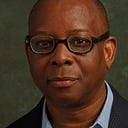Member-only story
The Ethical Economy of James Baldwin

In Begin Again, James Baldwin’s America and its Urgent Lessons for Our Own, Eddie S. Glaude Jr. is, at times, as seething as Shango, the African Orisha deity known for his apoplectic tendencies. During other intervals, within this superbly wrought biography on Baldwin — considered one of the greatest American racial polemicists — Glaude can be as critical as Kant, sapiently quoting at will Whitman and Morrison, Du Bois and Emerson, Jesus and Joyce with elan and extended passage runs that are as ineluctably astute as they are of pure elegance.
In the parlance of the black church, from which Glaude emerged in Moss Point, Mississippi, Begin Again, is an earnest “testimony” of a middle-aged Princeton professor who has drank deeply of Baldwin’s dazzling, encompassing oeuvre. Glaude confesses that reading Baldwin has allowed him to examine the terrain of own his life, which begun in Southern obscurity and, as elliptically conveyed in the book, with a sense of deep paternal trepidation.
Baldwin similarly produced in Glaude a sense of angst so that for decades he avoided him, preferring instead, Ralph Ellison, the author of Invisible Man. He writes in the book’s introduction: “[Baldwin] told the truth, but anger dripped from the page. When I read The Fire Next Time, I could not reconcile his rage with his talk of love. It was like Dr. King meets Henry James meets Malcolm X meets Freud. Baldwin was too personal.”
Glaude finds all kinds of treasure among Baldwin’s “ruins” that truly illuminate our country’s ongoing democratic project. He discerns the importance of democracy and dire need to maintain the type of civilian sovereignty that are supported by an objective press as well as equal human and fair voting rights in the nation. He also has much to say about the dispiriting age of Trump: — its degraded moral economy, its ostentatious, twisted civic contradictions. The current president piques Glaude to the point of exclaiming: “And each time I see and hear Donald Trump, I try to beat back rage and hold myself together.”

In this modestly-sized volume, which stands partly as literary criticism of Baldwin’s corpus and partly as…
